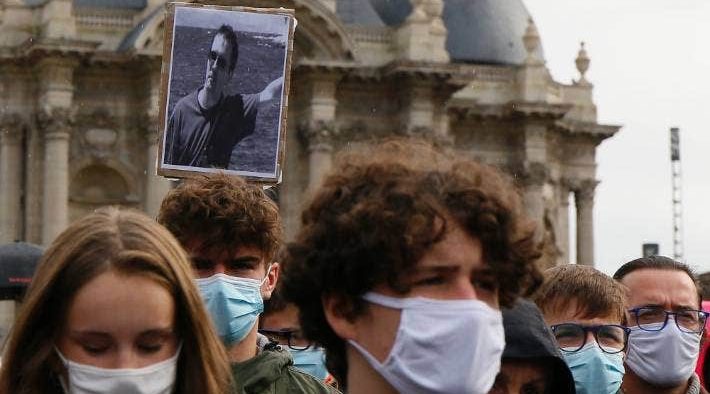Islam is not in ‘crisis’, France is

A portrait of Samuel Paty is held up as people gather in Lille, northern France in support of freedom of speech following the beheading of a history teacher. Donna Miles-Mojab:
I shouldn’t have to start this column by declaring the obvious; I shouldn’t have to prove that I was as disgusted and sickened as you were; I shouldn’t have to convince you that I hate violence and terrorism like you do; I don’t have to prove that I am as human as you are – but I know it’s best that I do it because I come from Muslim-majority Iran.
In fact, I better say it as clearly as possible so there is no doubt left in anyone’s mind: “I strongly condemn the despicable beheading of Samuel Paty – a French history teacher who showed his students a caricature of Prophet Muhammad during a class discussion about free speech. I admire Samuel Paty for being sensitive to the needs of his Muslim students. There was and can never be any excuses for such a gruesome act of savagery, none whatsoever, zilch, zero.”
Having made my views clear, let me now add something else: just as it’s possible to walk in two boots at the same time, it’s possible to condemn both this act of Islamist terrorism and some of the reactions to it.
But before I address President Emmanuel Macron’s problematic response to Islamist terrorism and his suggestion that Islam is “in crisis”, allow me to take you through a little history, because the past is the key to understanding the present – and yet, history and context are often missing when such events are reported in the media.
In 1995, France suffered a radical Islamist attack that killed eight people and injured more than 100. The Algerian-born terrorists, who carried out the metro bomb attack, brought the then ongoing civil war in Algeria (a fight between Islamists and the military) to the streets of their formal colonial ruler, inspiring a new generation of Islamist terrorists in France that can be traced to the Chechen-born killer of the history teacher.

When the Charlie Hebdo shootings happened five years ago, it did not surprise me that the terrorists were Algerian-French. Just as it has not surprised me to see, in recent days, twitter posts showing photos of French colonial soldiers holding up decapitated heads of Muslim Algerians.
Only a few months ago, France finally agreed to send back to Algeria, 24 skulls of 19th century anti-colonial Algerian fighters – among them a resistant leader, Sheikh Bouzian, who was shot and decapitated by the French. The skulls were originally taken to France as trophies and later put on display in France’s National Museum of Natural History.
There is no doubt that France’s long shadow of a century-long colonial history persists to this day. Algeria gained independence from France in 1962 after a bloody seven-year war, which according to the Algerian government left a million Algerians dead.
Let that sink in for a moment: a million dead Algerians and a century-long colonial rule.
Add to this shameful past, a history of neglect and marginalisation of Algerian-French Muslims, many of whom, live as second-class citizens in banlieues (low income housing development in suburbs of French cities, especially Paris) with no hope of social mobility or ever being perceived as fully French despite being born and brought up in France as second or third generation immigrants.

In 2017, Macron described colonialism as “a crime against humanity” and, after the Christchurch mosque attacks, joined our Prime Minister in condemning online hate and radicalisation.
This is all well and good – but if Macron is really serious about curbing extremism in his country, he has to also look at the extremism of poverty, unemployment and marginalisation among Muslims in France – be they Algerian, Chechen or other.
In June, Algerian and Chechen gangs openly fought each other in Dijon for consecutive nights, brandishing axes and firearms.
If there is a crisis in France, it does not come from Islam as Macron suggested; it comes from the country’s colonial past, and its own crisis of deep inequality and structural racism, which, over the decades, have left generations of Muslims in France feeling humiliated, marginalised and without a place to call home.
President Macron’s speech in response to the gruesome murder – and the projection of the controversial cartoons of Prophet Muhammad on the government buildings, have only stoked the fires of division.
Many Muslim countries, offended by President Macron’s earlier remarks about Islam, have called for a ban on all French products.
In moments of crisis, real leaders encourage unity and tolerance as our Prime Minister did after the Christchurch mosque attacks. She did it by strongly condemning the terrorist – but also by acknowledging the existence of racism in New Zealand and the need to address it as a nation.
If President Macron is truly committed to the freedom of expression in France, he should consider reversing the ban on face coverings.
As for continued Islamist terrorist attacks, the solution has to include tackling egregious inequality, ending stigmatisation of Muslims and strengthening religious institutions so Muslim youths can stay anchored and connected to their pious and peace-loving communities, instead of joining gangs and extremist groups.
Let’s learn from history: “no justice, no peace”.
Donna Miles-Mojab is an Iranian-born journalist living in Christchurch. Stuff











